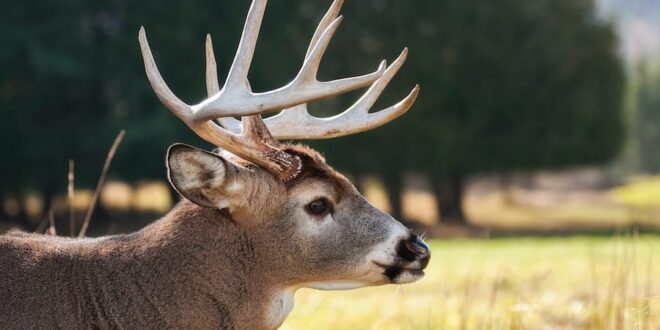Does human urine scare deer? Deer, known for their powerful sense of smell, rely on this sense to find food and detect potential predators. This raises the question: does human urine scare deer?
Whether you are a hunter or simply concerned about protecting your garden from these graceful creatures, understanding the impact of human urine on deer is essential for taking appropriate action.
Some believe that the scent of human urine can deter deer from entering an area, or spook during hunting, while others argue that deer are not bothered by it. Which is which? You’ll find out soon enough, but first, let’s answer the question
Does Humans Urine Scare Deer?
Human urine by itself does not necessarily scare deer. Deer are curious animals and may come to investigate any new smell that enters their territory, even human urine.
This behavior is driven by their natural curiosity and the need to assess any potential threat in their surroundings.
However, deer are intelligent creatures and can also associate certain scents with predators (wolf urine) and would immediately flee.
Predator And Danger Perception – Deer vs. Human
Both humans and deer have unique abilities to identify and respond to potential environmental threats. Deers’ survival heavily relies on their ability to detect predators such as wolves or mountain lions.
Their eyes are positioned on the sides of their head, providing them with a wide field of view, while their large ears can swivel independently, which enables them to pinpoint the source of any sound.
Additionally, deer possess a highly developed sense of smell that allows them to detect predators from afar. These exceptional sensory abilities give deer a high level of predator and danger perception.
On the other hand, humans have a different approach to predator and danger perception. While we do not face the same threat from predators as deer, our ability to detect and respond to danger is still crucial for survival.
We rely on sensory inputs and cognitive processing to assess potential threats. Our vision plays a significant role in recognizing danger, as we can quickly spot unusual or threatening objects or movements.
Our highly developed cognitive abilities also allow us to evaluate potential risks and make decisions accordingly. Humans can also use tools and technology to enhance their predator and danger perception.
For example, security systems, cameras, and alarms help us monitor our surroundings and detect lurking threats.
Deer Hunting Myths About Scaring Deer Away
1. It’s often said that deer are completely colorblind and cannot perceive colors. While they have limited color vision compared to humans, they can still see some colors, especially in the blue and green spectrum.
2. Deer can’t see elevated hunters. While elevated in a tree stand can provide better visibility and scent control, it’s not a guaranteed invisibility cloak. Deer have a strong sense of motion detection and can still spot hunters in tree stands if they move carelessly.
3. Some hunters believe that deer activity is primarily influenced by lunar phases, with specific moon phases indicating peak movement times.
However, scientific evidence on this matter is inconclusive, and factors like weather, food availability, and human disturbance significantly impact deer movement.
4. Contrary to popular belief, bucks don’t always roam alone. During most of the year, they may be solitary, but during the breeding season (rut), they actively seek out does and may be found in groups.
5. The common belief that car headlights immobilize deer is a myth. While some deer may freeze in response to bright lights, others might flee or react differently depending on their behavior and circumstances.
6. Deer are always nocturnal. While deer are more active during dawn and dusk, they are not strictly nocturnal. They can be active during the day, especially in areas with less human disturbance or favorable weather.
7. Some misconceptions suggest that hunting negatively impacts deer populations. In reality, well-regulated hunting can play a role in conservation efforts by managing deer populations, funding wildlife management programs, and supporting habitat preservation.
8. Loud noises scare all deer away. This statement is not entirely true. While sudden loud noises can startle deer, they can also become accustomed to certain sounds, especially in areas with human activity.
9. Rattling antlers always attract bucks. While rattling antlers can attract bucks during the rut, it doesn’t always guarantee success.
The response varies based on factors like the deer population density, local rut timing, and the dominance status of the responding bucks.
Easy And Clever Way Of Keeping Deer Off Your Garden
Keeping deer out of your garden can be challenging, but you can use several easy and clever methods to protect your plants and flowers.
- Use electric fence – Installing an electric fence is a proactive approach to keeping deer out of your garden.
Electric fences emit a mild shock when touched, which creates a negative association for deer. Ensure the fence is tall enough (around 8 feet) and properly maintained to ensure its effectiveness.
- Spray repellant – There are many commercially available sprays that are designed to repel deer and other wildlife. These sprays often have a strong odor that deer find unpleasant, causing them to stay away from your garden.
- Outdoor dogs – If you have dogs, they can also help keep deer away from your garden. Dogs are natural predators of deer, and their presence can scare them from entering your garden. You, however, need to ensure your dogs are well-trained and don’t harm the deer.
- Plant thorny, hairy, or prickly foliage – Deer are less likely to browse on plants with thorny, hairy, or prickly leaves. Integrate plants like holly, barberry, and cacti into your garden design.
These plants provide texture and interest and act as a physical deterrent, making it uncomfortable for deer to feed on them.
- Use scarecrows – Scarecrows are not just decorations for Halloween; they can also be effective in keeping deer away from your garden. Deer are easily startled by sudden movements or loud noises, so placing scarecrows in your garden can help deter them.
- Motion-activated sprinklers – When a deer approaches the sprinkler, it triggers a sensor that activates it and sprays water toward the deer. This sudden burst of water startles the deer and encourages them to leave the area.
Plants That Deer Hate
Deer have a keen sense of smell and will steer clear of any strong odor that hampers their ability to detect predators nearby.
Plants that deer don’t like can be a great addition to any garden or farm. These plants produce scents that deer find repulsive, making them an effective deterrent.
Strategically planting these plants around the perimeter of your garden or scattering them throughout your farm can keep deer away and protect your crops. They include;
- Marigolds (Tagetes Species) – Marigolds emit a strong scent that deer tend to dislike. They also have vibrant flowers that can add beauty to your garden while serving as a deterrent.
However, some people may not enjoy using them because they do not enjoy the smell of marigolds. If this is the case, there are other options available.
- Putrescent egg – This commercial product made from processed eggs has a strong and offensive odor to deer. The smell of putrescent egg solids mimics that of decaying flesh, which naturally repels deer.
- Garlic (Allium Sativum) – The strong scent of garlic is known to deter deer from feeding on nearby plants. Planting garlic around the perimeter of your garden or mixing crushed garlic with water and spraying it on your plants can help keep deer away.
- Mint (Mentha Species) – Mint has a strong aroma that deer generally avoid. However, be cautious when planting mint, as it can spread aggressively and become invasive.
- Tansy (Tanacetum Vulgare) – Tansy emits a pungent odor and would work as a great deer deterrent, but you must be cautious. They can be toxic to livestock; therefore, you shouldn’t plant them in areas where livestock graze.
Conclusion
Does human urine scare deer? While some believe that the scent of human urine can deter or scare deer, no scientific evidence supports this claim.
The perception of fear in deer may be influenced by various factors, such as the individual animal’s previous experiences and its level of familiarity with human presence.
Ultimately, deer have evolved to adapt to their surroundings and can detect and respond to a wide range of scents and stimuli.
 Being Human
Being Human




